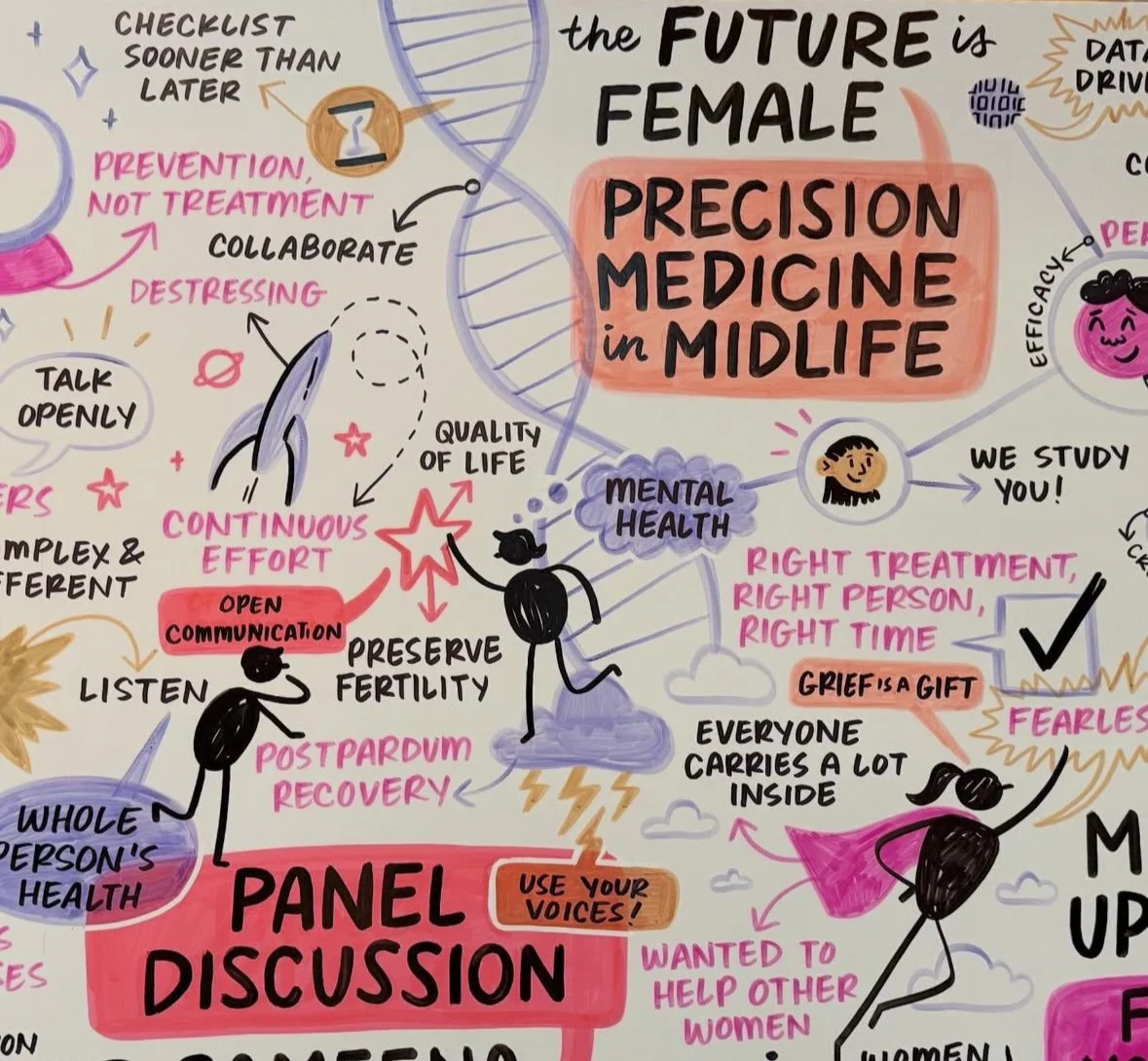Precision Medical Care Newsletter September 2025
From the desk of Dr. Johnson
Wrapping up September 2025! A time of great connection and impact with our precision medical community and our colleagues in the community of healthy longevity and precision medicine.
September is a favorite month for me as the new season is so full of ambition: for academics, athletics, growth. There is a palpable and adaptive energy with the change of season. Like so many of you, these days have have been filled with incredible moments. Many moments of joy and laughter yet many humbling and deeply tender moments of vulnerability, too. This is life. It’s hard yet so great, too. The weddings, the reunions, the babies, the giggles and the sunshine… as awesome as the moments you find out your insurance denial was overturned after months of appeals. There are also the job losses and transitions, the setbacks, the losses of life and the dreaded test results.. yet, we find our way through every moment. The path is stronger when we hold the light for one another to take that next step to health and with faith for a brighter future. To my precision medical physician partners Dr. Agarwal and Dr. Sadiq and our precision medical community: thank you for learning with me and lighting my path to be a better friend, partner and doctor to you, I am truly grateful.
My notes from recent conversations in the room with:
From Dr. Peter Attia:
“I think medicine is a tough profession. I don't need to tell anybody in this room that. I almost have never met a doctor who hasn't gone into it for the right reasons. And that's not just true of doctors, it's true of nurses. Anybody who touches this system, it really is a system that attracts people who just want to help people. It is sad for me to realize how difficult the system is if you're operating fully within it, and how much burnout can just become a challenge. And again, this is an example of where, even on my worst day, I feel incredible gratitude for the way that I get to practice medicine, which is I'm not on a clock, I'm not being managed by a health maintenance organization or something like that that doesn't want to practice the medicine the way I see it should be practiced for a patient.”
From Dr. Jeffrey Gladden:
“The meaning of life is creating joy from a loving place. The purpose is to reside in love and create joyful experiences. Optimizing the nervous system is crucial for longevity and mental health. Mental health issues often stem from trauma, which can be healed and transcended through understanding and forgiveness. Unconditional love, especially self-love, is essential for well-being. Getting away from self-criticism allows us to love ourselves and move into a world of abundance. Relationships are vital to vitality and longevity. A great relationship involves knowing and being known, loving and being loved, which requires vulnerability and courageous conversations.”
Dr. Gabrielle Lyon:
“There is no person who is sedentary that is metabolically healthy. “
“Muscle is the organ of longevity and an organ system you can actively modify favorably with precision training, targeted supplementations and feeding: protein adequacy with functional resistance training, jump squats and deep knee bends and kicks can really boost muscle growth.”
“Every bite counts” especially as you get older. Limit passive eating and instead choose to prioritize feeding with fiber and protein.
From Dr. Sara (Gottfried) Szal:
“93% of Americans are metabolically unhealthy. Metabolic dysfunction in the female body has far greater consequences than in the male body. Over age 40, women gain about 5 pounds of fat and lose about 5 pounds of muscle every decade unless you're doing something about it.”
Dr. Agarwal speaking at the Vibrant Longevity Summit: she’s a star on a stage shared with Doctors Peter Attia, Sara Szal, Andrew Huberman, Gabrielle Lyon, Rhonda Patrick - just to name a few of the amazing people who came together for this conference.
Dr. Agarwal speaking about precision health at the Women’s Executive Network of Chicago in September 2025.
Menopalooza 2025
Doctors Johnson, Agarwal and Sadiq spoke on a precision panel of menopause experts.
Thanks to WGN TV and our favorite area news anchor Ben Bradley who supported our request to highlight the first Menopalooza in Chicago. This is a video clip of the segment. Tickets for virtual livestream of Menopalooza from this Sunday, Sep 28 are available.
This was a really fun and lively event and we recommend reading Julie Fedeli and Pamela DeRose’s book “MidLIfe Upgrade” and Dr. Kelly Casperson’s book “The Menopause Moment”.
Doctors Johnson and Agarwal at Menapolooza Chicago with bestselling author Dr. Kelly Casperson and precision stylist Amy Banas.
Brilliant creators from the Ink Factory illustrate precision discussions at Menopalooza.
Dr. Johnson's Podcast Interviews
Dr. Catherine joined colleagues and friend Dr. Rebecca Hertel, on their fun podcast the “Dusty Muffins” to talk about women’s precision health. Watch on YouTube or listen on Apple Podcasts.
Dr Catherine with the “Dusty Muffins” speaking on precision health, metabolism and hormones.
Dr. Catherine also enjoyed a great conversation about metabolism and weight loss resistance with Jill Foos, a gifted and talented midlife women’s health coach. Watch on YouTube or list on Apple Podcasts.
In the News
Pemgarda: This is a monoclonal antibody therapy as an option for PRE exposure prophylaxis of SARS CoV2 for immune compromised patients, learn more about this option here.
Pharmacogenomics testing: Quest’s new test to predict drug interactions /side effects with highly detailed reports that report one’s expected metabolism and side effect profile to specific medications. This test can be added to your next panel of labs though the test would be billed to insurance and if insurance doesn’t cover the cost of the test, Quest has agreed to limit the direct-consumer cost for $299. Learn more about the test here.
Covid Precautions: Azelastine Antihistamine nasal spray may limit transmission of COVID-19, study finds | CIDRAP.
As we have mentioned in previous newsletters, our precision medical care patients are offered blood based testing for amyloid proteins offered by Quest. The P Tau blood biomarkers are predictive of amyloid deposition seen in brain imaging on amyloid PET scan. With precision medical diagnostic testing, we can test and guide preventive strategies to protect brain health with targeted intervention: exercise, anti inflammatory diet, blood pressure, lipid and blood sugar management, etc.
We are also partnering with Dr Christin Glorioso’s research study to offer expanded assessment of one’s “neuro age.” This test bundle offeres MRI brain testing for targeted assessment of brain volume measurements related to memory and brain aging, advanced genomic sequencing and neurological assessments with online testing to assess memory and processing speeds. The data is trended over time with targeted recommendations related to lifestyle and neurological therapies. Our patients can order this test for 20% off with code “precisionmedicalcare” https://www.neuroagetx.com.
Biomarker Spotlight: Gait Speed/Walking Speed
You can trend your gait speed using your iphone or watch/wearables. As we age, our gait speed slows and this is a modifiable risk factor with targeted attention to your exercise and movement regimen.
Average walking speed varies depending on factors such as age, gender, fitness level, and health status. Generally, the average adult walking speed is about 3 to 4 miles per hour (approximately 4.8 to 6.4 kilometers per hour). Younger adults tend to walk faster, averaging closer to 4 mph, while older adults may walk at slower paces, around 2.5 to 3 mph.
Walking speed is an important indicator of overall health and mobility. It reflects cardiovascular fitness, muscle strength, balance, and can even predict risk of future health issues. A decline in walking speed may signal emerging health concerns and warrants clinical attention.
At Precision Medical Care, we integrate walking speed assessments into personalized health evaluations. By measuring and monitoring your gait speed, we identify potential mobility issues early, uncover root causes of slowed movement, and design targeted interventions to optimize your functional health and enhance quality of life.
Improving walking speed involves a combination of strength training, cardiovascular exercise, balance enhancement, and addressing underlying medical conditions. Our physician-led team customizes care plans rooted in precision medicine to help you regain and sustain optimal mobility, empowering you to thrive.
Keep a hustle to your walking speed: on a walk, at the airport or on a hike. Track and monitor your gait speed as this biomarker predicts aging: a shuffling or slower gait can signal a sign of neurological or musculoskeletal decline.
Dr. Agarwal interviews Dr Molly Altenburg on managing FH, elevated Lp(a), and ApoE4-positive patients
As many of our patients know, the wait times can be 6-18 months to see lipid specialists who are experts in the research of lipid metabolism related to familial hypercholesterolemia, elevated lipoprotein(a) and ApoE 4 positive patients. Dr. Agarwal had the pleasure of connecting with Molly Altenburg, MD and asked her if she would answer some of our commonly asked questions/concerns related to her area of expertise. Dr. Altenburg is a non-invasive cardiologist at Rush University specializing in preventive cardiology, advanced cholesterol management, and women's heart health.
1) Lp(a) is in the spotlight more lately—what should women (and men) know about how it differs from traditional cholesterol, and why does it matter so much for heart health?
Lipoprotein (a) is a subtype of cholesterol and is an independent risk factor for early coronary and valve disease. It has a different surface protein that makes it effectively "stickier," meaning it is associated with more blood clotting, more inflammation and more coronary artery disease. It is predominantly genetically determined, so unfortunately is not something we can affect with significant diet and exercise changes (blame your parents!). We have found a linear relationship between Lp(a) and cardiac risk, so the higher the Lp(a), the higher the risk. The current approach to modifying the risk conferred by an elevated Lp(a) is to be more aggressive about lowering LDL cholesterol (bad cholesterol) and to be more aggressive about controlling all other risk factors (weight, blood pressure, blood glucose, sleep, stress, etc). There are therapeutics on the horizon which can lower Lp(a) directly, although we are waiting for the results of major trials to see if this ends up also lowering cardiac risk, we hope so!
2) What makes women’s lipid profiles different from men’s? Are there red flags we might miss if we only apply the “standard” cholesterol lens?
In general women experience what we call a "protective effect," of estrogen on their lipid profiles from menarche until menopause. They usually have higher HDL and lower LDL-c ("bad cholesterol") than men, until estrogen levels drop in menopause, and then will often have significant increases in LDL-c. This corresponds with an uptick in coronary artery disease and heart attacks in women after menopause. We also see more variation in lipid profiles in women as their hormone levels fluctuate with the menstrual cycle, and some gender differences in specific subtypes of cholesterol. There are also a host of things that affect women's lipid profiles specifically, like PCOS, OCP, pregnancy, inflammatory disorders like lupus and rheumatoid arthritis, pregnancy complications, breast feeding...the list goes on!
3) Why do women often present with chest pain but “normal” EKGs, stress tests and angiograms despite having inducible coronary arterial spasm/constriction that can cause myocardial injury? What should men know about women’s heart health? Are there signals they should watch for in their partners, sisters, or daughters that doctors too often dismiss? Most of what we know about heart disease comes from studies and trials of primarily men, but we are very slowly starting to catch up. We are learning that chest pain in women is often more complicated than chest pain in men. Very broadly speaking, cardiac chest pain (angina) happens when there is not enough blood getting to the heart muscle (ischemia). In men this usually happens because of blockages in the large blood vessels that wrap around the outside of the heart to feed the heart muscle (obstructive epicardial coronary disease). In women, we are learning that they can have dysfunction of the small blood vessels but have normal big blood vessels. There are different subcategories and nuances here, but broadly speaking we are talking about dysfunction of smaller blood vessels. So they are having chest pain from not getting enough blood to the heart muscle, but the level of the problem is different. Until recently we would just evaluate the large coronary blood vessels and if there was no blockage tell women we don't know why they are having chest pain. Now we have more refined testing and can diagnose these problems specifically and provide tailored therapy that will help these patients feel better and have better long-term outcomes.
But women also get "traditional" heart disease with blockages of their BIG blood vessels, and it's super important not to miss this! The "normal" presentation of heart attacks that we learn in medical school (crushing chest pain) is more often found in men. Women will often have less typical symptoms like abdominal pain, nausea, shortness of breath, fatigue, "not feeling right," and can have their chest pain dismissed. It's important to know and trust your own body, you know when something is not right!
4) Hormones clearly play a role in cardiovascular risk. Why should hormone therapy be considered a serious part of the prevention or treatment conversation for midlife women? Are there specific windows—like perimenopause or early menopause—when hormone therapy is especially protective for women?
These are great and complicated questions that would need a lot more space to answer thoroughly. BUT, what I will say is that the pendulum has swung very dramatically when it comes to how we approach menopause hormone treatment and cardiac risk. There were two major trials in the early 2000s that pointed to worse cardiac outcomes with menopause hormone treatment, and this really altered how menopause symptoms were treated for decades. We are now learning that these trials were flawed in how they were structured and interpreted, and if we look specifically at women who are within 4-10 years of menopause, hormone treatment might actually lower rates of heart disease. This is a complicated conversation, however, and varies with different hormone formulation, your specific cardiac risk, etc. The consensus now is that if you are within 10 years of menopause, are having symptoms related to menopause, and you do not have major cardiac risk, the risk-benefit analysis generally favors treating your menopause symptoms with hormone treatment.
5) What are the most exciting tools (genetics, advanced lipoprotein testing, imaging) that can personalize risk beyond the old LDL target?
This might sound corny, but I think the most important tool we have is really listening to patients and working together to develop goals. The best, smartest, most advanced physician is not going to be successful if they don't prioritize a trusting therapeutic relationship with their patient. Beyond that it is certainly an exciting time to work in this field and there are new testing and imaging modalities being developed that will hopefully refine our ability to assess cardiac risk, and new therapeutics being developed to help address that risk. Specifically I'm excited to follow the development of non-invasive coronary plaque characterization tools, new Lp(a) therapeutics, and gene therapy!
6) If you had a billboard to broadcast one truth about women and cardiovascular disease, what would it say?
Heart disease is the number one killer of women. Too many women still don't appreciate this and I think it's so important to start young and take a proactive approach to managing your long-term risk. Oh, and also lift heavy weights, but that's another soap box for another day:)
From the desk of Dr Sadiq
Dear Patients,
It has been such a privilege to be part of your health journey at Precision Medical Care. Over the past months and years, I have listened to your stories, worked with you to uncover root causes, and celebrated the steps you have taken toward your healthiest, most vibrant life.
I want to share that I will be transitioning from Precision Medical Care to focus fully on my own practice, Well Endocrinology. This was not an easy decision, because the relationships we have built together mean so much to me.
I am especially grateful to Dr. Catherine Johnson for her leadership, vision, and generosity in creating such a unique space for patient-centered, data-driven care. Working alongside her and the Precision team has been a joy and an honor.
While my path is moving in a new direction, I am deeply thankful for the opportunity to care for such an extraordinary community of people who approach their health with curiosity, courage, and intention. You have inspired me every step of the way.
Thank you for trusting me with your care. I will always cheer you on in your pursuit of health and longevity.
With gratitude and warmest wishes,
Dr. Sobia Sadiq
Biomarker Spotlight: Homocysteine
Homocysteine
Homocysteine is an amino acid produced in the body during the metabolism of methionine, an essential amino acid obtained from dietary proteins. Elevated levels of homocysteine in the blood, a condition known as hyperhomocysteinemia, are associated with an increased risk of cardiovascular diseases, including heart attack, stroke, and peripheral artery disease.
Causes of Elevated Homocysteine
Nutritional deficiencies, particularly of vitamin B6, vitamin B12, and folate
Genetic mutations affecting enzymes like MTHFR (methylenetetrahydrofolate reductase)
Chronic kidney disease
Certain medications and lifestyle factors such as smoking and excessive alcohol use
Clinical Significance
High homocysteine levels can promote inflammation, oxidative stress, and damage to the endothelial lining of blood vessels. This contributes to the development of atherosclerosis and blood clots. Monitoring homocysteine can help identify individuals at risk for cardiovascular complications and guide interventions.
Management and Treatment
Supplementation with B vitamins (B6, B12, folate) to support homocysteine metabolism
Dietary modifications emphasizing leafy greens, fruits, and fortified grains
Addressing underlying health conditions and lifestyle changes such as smoking cessation and regular exercise
At Precision Medical Care, we incorporate homocysteine level assessment as part of a comprehensive, personalized approach to optimizing cardiovascular health and reducing disease risk through targeted, data-driven interventions.What are the effects of high homocysteine levels? Elevated homocysteine has been associated with increased risk for a variety of diseases (see the figure below).
Studies show that up to 40% of patients diagnosed with premature coronary artery disease, vascular disease, or recurrent venous thrombosis have elevated homocysteine levels.
This increased risk is driven by homocysteine’s tendency to create oxidative stress and impair blood vessel dilation by nitric oxide. It also increases inflammation by inducing secretion of pro-inflammatory cytokines (IL-1β, IL-6, IL-8, and TNF-α). These cytokines are linked to reactive oxygen species (ROS) formation and the activation of nuclear factor kappa B (NF-κB). Cytokines recruit immune cells, which become pro-inflammatory and transform into foam cells, contributing to plaque formation.
In summary, genetic variants in the MTHFR gene are very common. They lead to high homocysteine levels and folate deficiency, which causes increased risk for stroke, depression, heart disease, and many other conditions. Our precision approach to managing elevated homocysteine levels is targeted supplementation and diet: eating B vitamin- rich foods, including salmon, oysters, lentils, peas, asparagus, spinach, and mushrooms.
Precision Recommendations: Podcasts and Instagram Accounts
Podcast:
Instagram accounts to follow for advanced precision perspectives related to healthy longevity:
Dr Johnson’s Naples office dates:
October 3rd-October 6th
November 3rd
January 7th-January 20th
February 3-February 10th
*More dates to come for 2026*





